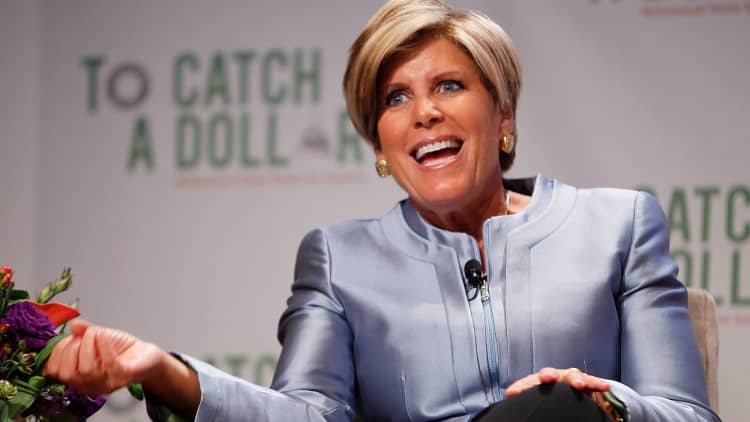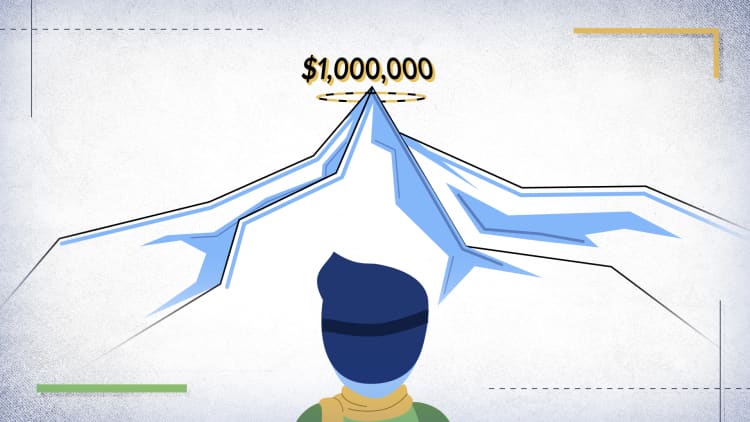Once you hit your 50s, retirement is no longer something happening far off in the future.
Whether you have been a super-saver your entire career or are just starting to think about retirement, it's time to take a serious look at what you expect your golden years to look like.
For those in their 50s, "it is the most important time to really figure out where they are, reassess their goals long term and really focus on planning," said certified financial planner Diahann Lassus, co-founder, president and chief investment officer of wealth-management firm Lassus Wherley, a subsidiary of Peapack-Gladstone Bank.
That means crunching the numbers and really thinking about when you want to retire — and how you are going to get there.
While it may be easy to get distracted by other financial obligations, like helping your kids pay for college or a young adult child moving back home due to the coronavirus pandemic, remember to "put your mask on first," said Lassus, a member of the CNBC Financial Advisor Council.
"You have to take care of yourself because no matter how brilliant your children are, they really aren't going to want to support you later in life," she said.
'I don't really have a plan'
For small-business owner Greg Dailey, retirement is something he never gave much thought to. Instead, the 51-year-old has been focused on growing his framing business, located in Chatham, New Jersey, picking up extra cash from his side hustle delivering newspapers and raising his three children with his wife, Cheryl.
"I don't really have a real plan," said Dailey, who grew up poor and without any financial literacy instilled in him as a child.
"Am I going to have enough money to ever 'retire'?" he said. "I don't know.
"I don't think so."
More from Invest in You:
With remote work flexibility, some people opt to relocate ahead of retirement
How to take the mystery out of picking the best retirement savings plan
Dreaming of retiring abroad? Here's what you need to know
He puts much of his focus on his kids. His oldest, 24-year-old Erin, was the first in his family to go to college. His 22-year old son, Sean, is currently a senior in college and 17-year old Brian is a high school senior. While his kids all have, or will have, student loan debt, Dailey is doing what he can to help out financially.
He has been able to put aside about $13,000 in an emergency fund, but he has no retirement savings and two mortgages on his house in East Windsor, New Jersey — which add up to more than what he paid for it more than 20 years ago.
"I've always been in survival mode," he said.
Fortunately, his business didn't suffer too much during the coronavirus restrictions and is growing. His wife has a 401(k) and he plans on working hard for the next 10 years and putting money aside.
"I'm going to have to start investing," he said. "Hopefully in the next 10 years I'll be able to pay off my house."
The first step
If you haven't started saving yet, the first thing to do is to examine your expenses and where you can cut so you can begin putting money aside.
Also, look at your overall expenses — what you spend money on today that you won't have to in 10 years to 15 years, like college tuition, mortgage or car payment, said Brian Walsh, senior advisor at Walsh & Nicholson Financial Group, based in Wayne, Pennsylvania.
"Retirement is expense-driven, not necessarily assets-driven," he said.
From there, determine what you'll need to live on in retirement and see how much you'll need to save in addition to any Social Security you may collect, he said.
Boost your retirement savings
Put as much as you can into your 401(k), if you have one, advises Lassus.
Once you hit 50, you are allowed to make up to an additional "catch-up" contribution each year. For 2020, the catch-up limit is $6,500, which can make a huge difference down the road, she said.
If you don't have an employer-sponsored plan, then contribute as much as you can to a Roth individual retirement account, if you qualify, or a traditional IRA. Your annual contribution for 2020 is capped at $7,000 if you are age 50 or older.

While Roth IRAs are widely beloved by financial professionals, since contributions are made after tax and distributions aren't taxed, there are income limits. You can contribute the full amount if you make less than $196,000, if you are married and filing jointly, or less than $124,000 if you are single. However, you can still contribute a reduced amount if you make less than $206,000 as a married person or under $139,000 if you are single.
Then, there are Roth 401(k) plans. Contributions are made after tax and there are no income limits. The maximum contribution is the same as the traditional 401(k). Walsh is a fan of the plans and said he believes it is a good way to take advantage of low taxes today.
"With the swelling debt taken on by the U.S. government, taxes are going to have to go up," he said.
In other words, pay now at a lower rate than later at a potentially higher one.
Watch your asset allocation
You'll want to make sure your retirement portfolio keeps pace with inflation. These days that means staying middle-of-the-road in a moderate-risk portfolio, Lassus said.
"I wouldn't start getting more conservative," she said. "The old 60-40 still works."
The standard 60-40 portfolio means 60% is invested in equities and 40% in fixed income.
Make sure you really understand where you are relative to where you want to be when you get ready to retire.Diahann Lassuscertified financial planner
Walsh agrees that at this point, 10 years to 15 years from retirement, you want a majority of your assets in equities and, even five years to seven years away, he would keep 60% to 70% in stocks, since there is a lot of risk in the bond market these days.
If you have a 401(k), he suggests sticking with a target date fund, which automatically rebalance as you get closer to retirement.
Have non-retirement savings accounts
What you have in your 401(k) or IRA likely won't be enough to retire on, even if you are maxing out your contributions, Lassus said.
"The 401(k) doesn't provide the kind of dollars that a person is used to," she said.
Therefore, having money outside of your retirement accounts is important, as well.

"Otherwise, what happens is, when people retire, they have to be very creative at reducing expenses," she said.
First, have an emergency fund. Typically, that is three months to six months of expenses that is easily accessible.
After that, start making monthly investments in a brokerage account using primarily a mutual fund or exchange-traded fund, advised Lassus.
Pay off your debt
Debt is a big issue for many in their 50s, Lassus said. If you have credit card debt, try to get it under control.
Also, take a look at any car debt you have, like a lease, which is an ongoing cost, she said.
While many aim to pay off their house by retirement, she wouldn't focus as much on paying off your mortgage.
In the end, making sure you are ready for retirement means continually updating your plan.
"Make sure you really understand where you are relative to where you want to be when you get ready to retire," she said.
SIGN UP: Money 101 is an 8-week learning course to financial freedom, delivered weekly to your inbox.
CHECK OUT: My side hustles bring in $5,000 a month: Here's my best advice for getting started via Grow with Acorns+CNBC.
Disclosure: NBCUniversal and Comcast Ventures are investors in Acorns.






